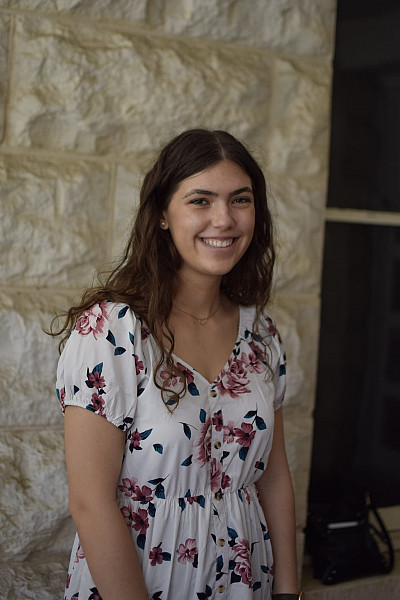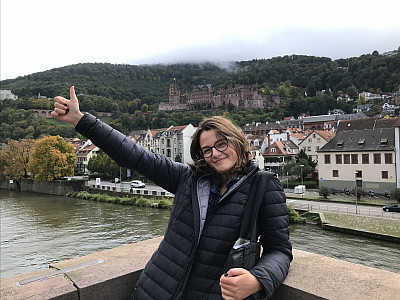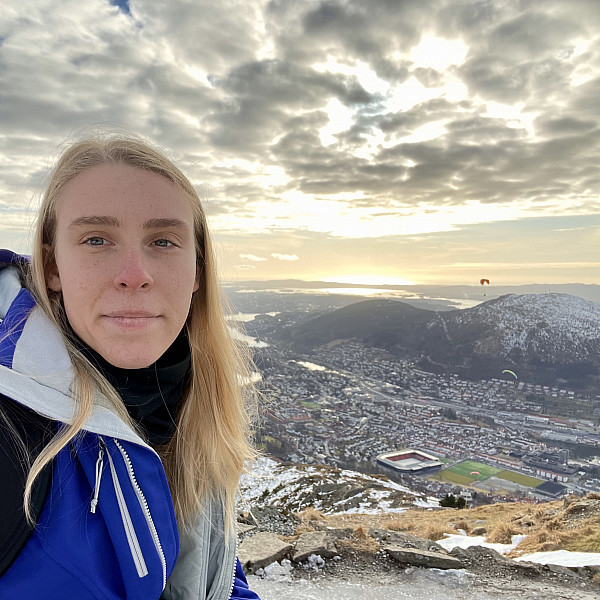News
Two Seniors Receive Fulbright Awards for 2022–2023
May 11, 2022
May 11, 2022
Catherine Hiebel ’22 and Melina Boutris ’22 are Southwestern University’s newest Fulbright award recipients. Hiebel, a political science and Spanish double major, will teach English in Spain through the Fulbright U.S. Student Program, while Boutris, a German and education double major, will serve as an English teaching assistant in Austria through Fulbright Austria.
In addition to the two award recipients, Emma Astad ’22 and Christina Manzanares ’15 were named Fulbright U.S. Student Program semi-finalists.
“The Fulbright is among the most widely recognized and prestigious scholarships in the world,” says Associate Professor of German Erika Berroth. “Our applicants this year were smart, engaged, and passionate, and they communicated their stories and aspirations well. Preparation for the Fulbright starts with day one in college, and our finalists and semi-finalists were intentional about seeking opportunities where they could act as teachers, mentors, or guides for younger audiences throughout their college years.”

Hiebel had long been interested in studying abroad, but the timing never worked out. As a member of the Southwestern women’s swimming and diving team, she couldn’t participate in many traditional study abroad programs because the athletic competition season spanned both the fall and spring semesters. Then the pandemic came along, shutting study abroad programs down completely and further complicating matters.
“During my junior year, I started thinking about what I wanted to do after graduating,” says Hiebel, who plans on studying political science in graduate school. “I still wanted to go abroad, so I was looking for ways to do that.”
Hiebel had heard of the Fulbright program, but she didn’t know it offered English Teaching Assistantships until she attended an informational session hosted by the Center for Career and Professional Development (CCPD). She was immediately intrigued, although she wasn’t confident about her chances.
“I didn’t feel qualified to do it, and I didn’t think I was going to get it,” she says.
Hiebel met with Alexandra Anderson, senior associate director of the CCPD, to discuss next steps and begin the application process. The Fulbright U.S. Student Program requires students to apply through their university, so Hiebel had to submit her application materials to her faculty mentors and Anderson for review in mid-September before her final application was submitted in October.
“I was very glad I went through the application process,” Hiebel says. “You have to write a statement of grant purpose and a personal statement, which is good practice for other applications. I was completing lots of other applications this past semester because I wasn’t counting on getting the Fulbright, and having had that experience made those much easier.”
In April, she found out her hard work had paid off when she was named a finalist. She will be teaching in the Canary Islands, and she’s excited to explore the area and put her Spanish language skills to use.
In addition to Anderson, Hiebel credits Associate Professor of History Jessica Hower, Professor of Spanish Katy Ross, and visiting Assistant Professor of Political Science Katie Aha with giving her much-appreciated guidance and encouragement throughout the application process.
“Without the three of them, I wouldn’t have been able to do this,” she says.

Boutris is no stranger to traveling abroad, having visited Portugal, Thailand, Oman, Tunisia, and Switzerland, among other countries. In fact, during the first year of the pandemic, the New Jersey native took her Southwestern classes remotely from Heidelberg, Germany, where her parents, native Germans themselves, had recently moved.
“I had to take classes in the evening. It was kind of rough,” she says. “I took a yoga class that ended at 8:45 at night, and then I just went straight to sleep.”
Boutris, who is currently student-teaching at Grisham Middle School in the Round Rock Independent School District, was interested in gaining additional teaching experience while improving her German skills in a new environment. After speaking with Berroth, she decided to apply for the U.S. Teaching Assistantship program, which is administered by Fulbright Austria and funded by the Austrian Federal Ministry of Education, Science and Research. For her placement, Boutris will be teaching English at a business school in Bregenz, the capital of Vorarlberg, Austria’s westernmost state.
“I’ll help students improve their oral skills and learn the lingo Americans use,” she explains. “It’s a chance for me to learn how to teach a different age group.”
She hopes to also continue her research with Southwestern faculty and study the differences between the U.S. and Austrian educational systems.
“Eventually I’d like to teach German in the public school system in the U.S.,” Boutris says. “I’m also thinking about earning my Ph.D. with a focus on teaching education majors how to teach foreign languages.”
While Boutris is looking forward to growing her skills as an educator, she’s also eager to learn more about Austria and explore her interests.
“I’m going not only to teach students, but also to broaden my horizons and take in the culture,” Boutris says. “I’m an artist, so in my free time I plan on going to museums. I also want to learn to ski; it’s the optimal environment for that.”
Prestige and value
Since 1946, the Fulbright U.S. Student Program has provided more than 400,000 participants from more than 160 countries the opportunity to study, teach and conduct research, exchange ideas, and contribute to finding solutions to shared international concerns. Recipients are selected in an open, merit-based competition that considers leadership potential, academic and/or professional achievement, and record of service.
“Fulbright grantees live and work in their host countries and engage with their communities in personal, academic, and professional contexts,” Berroth explains. “In their roles as cultural ambassadors, our graduates promote international understanding and collaboration.”
“For graduating seniors, especially those coming from liberal arts schools, it can be beneficial to take this time early in their careers to continue to build their skills and explore the world,” Anderson says. “The Fulbright program provides a phenomenal opportunity for a funded year abroad.”
As Southwestern’s Fulbright advisor, Anderson has helped guide many students through the application process. She notes that there’s no one right candidate for the program and encourages all interested students to apply.
“I would love for our students to dream big,” Anderson says. “If someone is thinking, ‘This is something really different for me,’ that’s great! That’s exactly who should be applying and who would be a great fit for the Fulbright program.”
Berroth notes that the benefits of a Fulbright award extend far beyond the time spent abroad.
“When they return to the U.S., Fulbright alumni participate in a substantial active network and continue their roles as agents of positive change and share their vision for peaceful relations among nations,” she says. “The Austin chapter hosts regular meetings, but you will find your tribe of Fulbright alumni worldwide.”
















